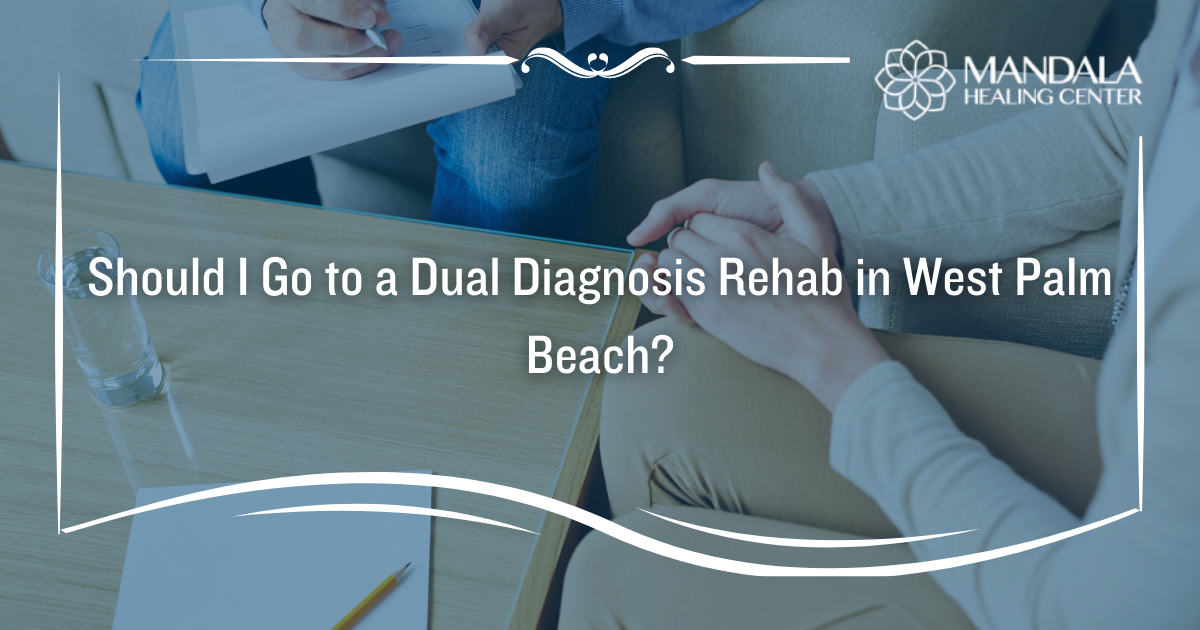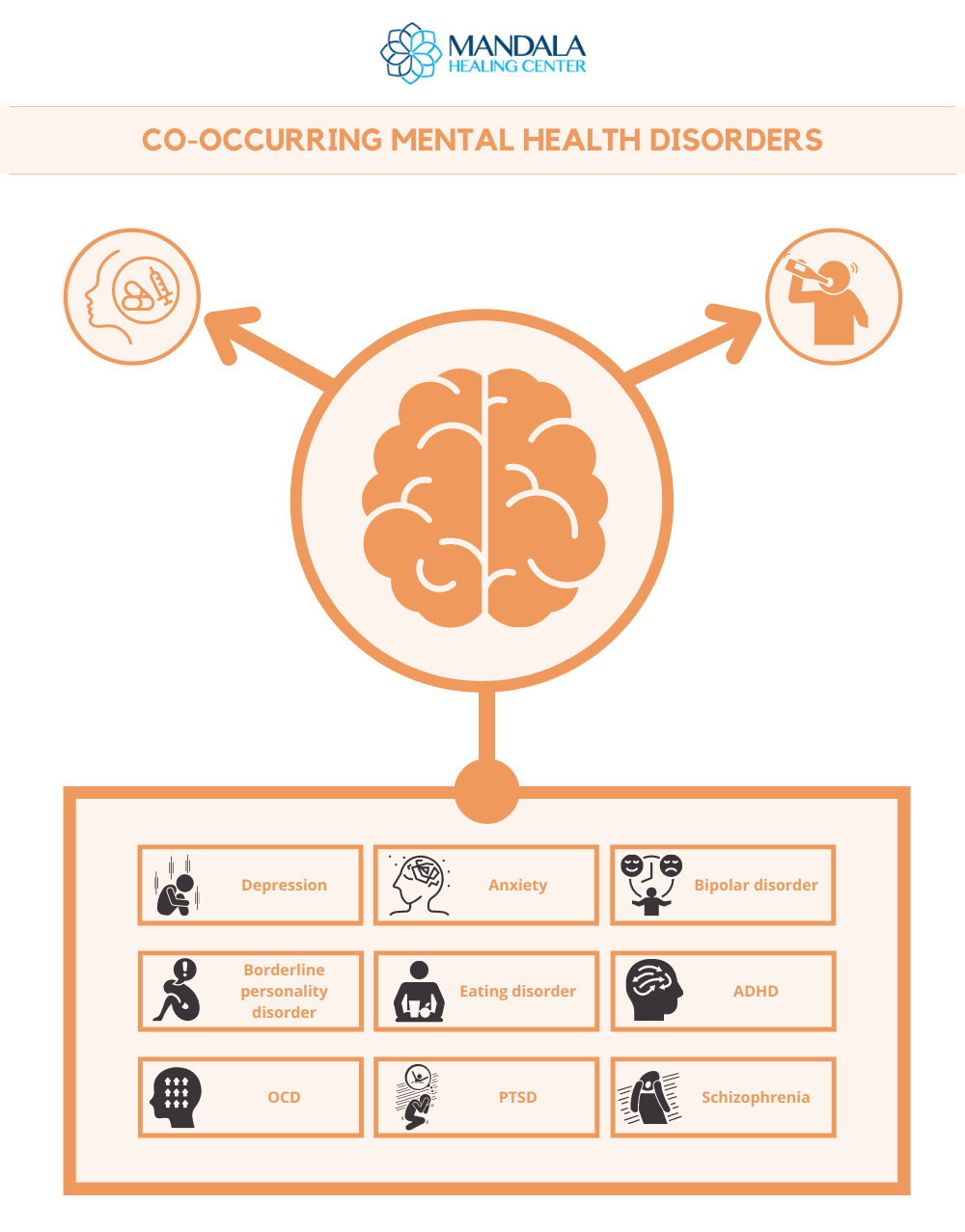Mental health conditions, like depression, anxiety, and PTSD often exist alongside addiction. Whether mental illness or substance abuse comes first, both conditions exacerbate the other. It’s important that whichever rehab you choose is able to address any mental health struggles you may have.
Underlying mental illness can complicate addiction as well as the recovery process. If you struggle with mental health and substance abuse, it’s vital that you receive dual diagnosis rehab to successfully overcome your difficulties. Dual diagnosis rehab in West Palm Beach is designed to address underlying issues and conditions so all individuals can get healthy and stay sober.
What are Co-Occurring Disorders?
People who are diagnosed with both substance use disorder (SUD) and a mental health condition are said to have co-occurring disorders or dual diagnoses. According to the National Institute on Drug Abuse, nearly 50% of people with mental illness also experience a substance use disorder at some point in their lives and vice versa. In adolescents, over 60% in treatment for substance abuse also met the diagnostic criteria for mental illness.[1]
Common mental health conditions that co-occur with drug and alcohol addiction include:
- Depression
- Anxiety
- Bipolar disorder
- Borderline personality disorder
- Eating disorders
- Attention-deficit hyperactive disorder (ADHD)
- Obsessive-compulsive disorder (OCD)
- Post-traumatic stress disorder (PTSD)
- Schizophrenia
The question of which condition develops first is unique for every individual. Some people begin abusing drugs and alcohol to cope with their mental health. Others get addicted to a substance and, over time, experience a decline in their mental health.[2] Regardless of which condition comes first, people who struggle with co-occurring disorders can benefit from a dual diagnosis treatment program.
Signs and Symptoms
Identifying a dual diagnosis can be complicated because many symptoms of mental illness are similar to those of addiction. Also, the specific type of mental health condition can influence the symptoms a person exhibits. A personalized evaluation and assessment by a mental health professional is the best way to determine if you have co-occurring disorders and need dual diagnosis rehab in West Palm Beach.
Some general signs and symptoms that are usually apparent with co-occurring disorders are:
- Using drugs or alcohol to cope with emotions, mood swings, unpleasant memories, or other situations
- Feeling more depressed or anxious while drinking but continuing to drink anyway
- Having a family history of mental illness and/or addiction
- Having been previously treated for mental health
- Isolating from friends, family, and other loved ones
- Loss of interest and motivation in daily activities
- Unusually low or high energy levels
What is Dual Diagnosis Rehab Like in West Palm Beach?
Dual diagnosis treatment programs follow the same format as a standard addiction recovery program. The main difference lies within the types of therapies offered. During dual diagnosis rehab, integrative mental health treatments are combined with addiction therapy to address both mental health and substance abuse at the same time.
Detox
The first step in treatment is detox. This is when you spend time under close medical supervision as the drugs and alcohol leave your system. You may experience unpleasant withdrawal symptoms that can be managed with FDA-approved medications.
Medication Management
While medications are almost always used during detox, dual diagnosis treatment programs take medication management a step further by helping you find the right medication for your symptoms (if applicable).
Not all mental health conditions require medication, but it can be particularly helpful in early sobriety as you are going through major changes. Medication can help stabilize you, get your symptoms under control, and allow you to focus fully on therapy and your recovery.
Throughout your time in treatment, you will have regular visits with your physician to discuss your symptoms, side effects, and medication adherence.
Individualized Dual Diagnosis Therapy
Behavioral therapies that are individualized to meet your unique needs are the most effective approach to treating dual diagnosis. After a comprehensive mental health evaluation, your counselor will decide which therapies you can benefit from the most.
Examples of therapy you can expect while at a dual diagnosis rehab in West Palm Beach include:[2]
- Cognitive-Behavioral Therapy (CBT)
- Dialectical Behavior Therapy (DBT)
- Assertive Community Treatment (ACT)
- Therapeutic Communities (TC)
- Contingency Management (CM)
- Multidimensional Family Therapy (MDFT)
Combined with the right medication, these therapies can be highly effective at helping individuals overcome addiction and cope with their mental health struggles.
Support Groups
Another important aspect of dual diagnosis treatment is support groups. Before you leave rehab, you should begin exploring different recovery-based support groups in your area, such as Alcoholics Anonymous (AA) or Narcotics Anonymous (NA). These groups and provide you with a sense of community, fellowship, and belonging which will help you in your recovery.
Aftercare
Neither addiction nor mental illness can be cured, but they can be managed with long-term care. Since rehab typically only lasts 30-90 days, it’s important to come up with a long-term plan for your recovery. Before you leave rehab, your substance abuse counselor will help you develop an aftercare plan. Your aftercare may consist of any or all of the following:
- Mental health counseling
- Outpatient rehab or IOP
- Sober living
- Alumni groups
- Support groups
These tools can help you reinforce the coping mechanisms you learned in sobriety while providing you with continued support.
Find Out if Dual Diagnosis Rehab in West Palm Beach is Right For You
Here at Mandala Healing Center, we believe in treating the whole person — not just your addiction. Our integrative holistic therapy approach helps you heal mentally, physically, and spiritually while being supported every step of the way. To learn more about dual diagnosis rehab or to find treatment in the West Palm Beach area, give us a phone call today.
References:













